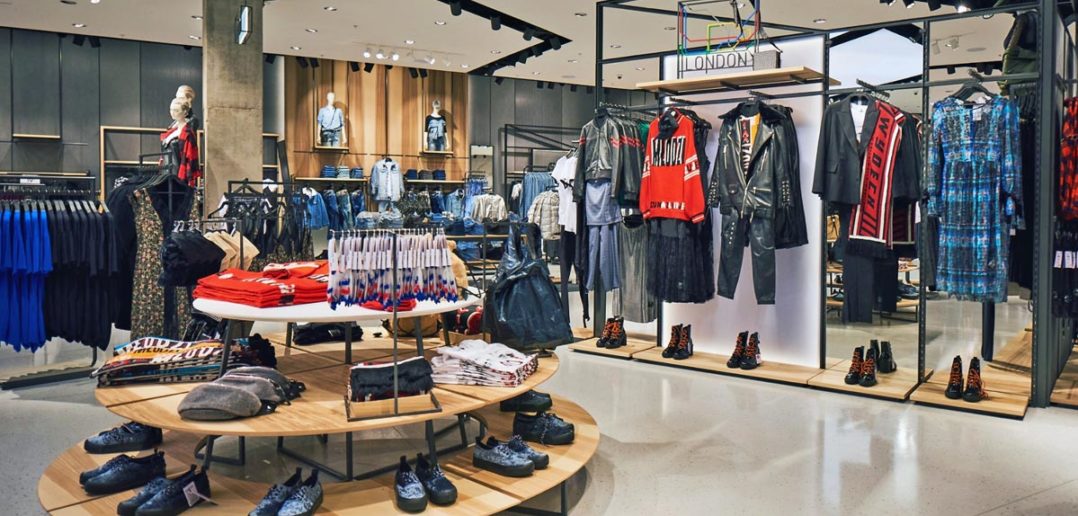The debut of Reserved on one of the most important shopping streets in Europe attracted crowds of customers for a store that exceeds 3,000 sq m and the entire display is located on one floor. The sales network of all LPP brands, includes more than 1,700 stores and Oxford Street has proven to be the best place to test new concepts.
“Thanks to our presence on Oxford Street, we got an insight into the preferences of international customers. During the course of the first year, online sales were another important source of knowledge about customer experiences and expectations. In comparison to other markets, this one exhibits a higher interest in premium lines, as well as capsule collections,” recalls Przemysław Lutkiewicz vice president of the LPP Board.
Well established in Russia, this year the Polish company will expand into Bosnia and Herzegovina, as well as Finland. LPP also plans to make its collection available online to customers across the EU.

Mixed use retail and leisure: What happens next? – White Paper
“Our stores are currently undergoing remodelling. We want to focus not on the quantity, but rather on the quality of the stores,” says Jan Grunt, expansion and investment director, LPP. “Our strategy for the next few years entails reconstruction and extension of the space of all LPP stores. We have decided to change the format of the stores. We have been increasing the store space. The space of individual Reserved stores currently amounts to 2,000-3,000 sq m. The smaller ones occupy between 800-1,200 sq m. The changes reflect the needs that we voice ourselves, as well as to cater to the needs of our customers. Each year, the number of models in the collections increases. The previous formats of our stores have become insufficient in terms of space, hence the decision to enhance them gradually.”
LPP is also going to implement new concepts of the stores on a “mass scale”. This will entail much bigger stores, with new arrangements, improved and more in line with customer expectations, equipped with “chill out zones, more modern in their vibe, completely different in terms of furniture arrangement, furniture sets and the space that the customer experiences,” says Grunt.
The ‘Open to public’ concept of the Reserved store, which made its debut in 2017 on Oxford Street, is also constantly evolving. This approach makes the product as accessible as possible to shoppers.

“We are perfecting it and adapting to the customer expectations,” says Grunt. “The new conceptual solutions for the stores, enhanced space, more models in the collections and the changes observed in the market, including the considerable importance of omni-channel demands in terms of delivery times and the possibility of collecting the goods ordered online at the stores, giving rise to new goals as regards the image of our stores, their functionality and space.”
Grunt says that for LPP success in the Russian market demands new relationships with landlords. And he is direct about what LPP hopes to see in order to push forward further expansion.
“It should also be emphasised that after the 2014 crisis, in particular in Russia, the trade margin changed radically – the need to retain the ‘proper’ price for the customer in our segment led to margins decreasing by 20 percentage points on average,” he says. “That fact also determines our need to obtain the market conditions of leasing, and not the conditions hitherto expected by landlords. In our view, this stage of the retail market is definitely over. The companies which failed to adapt to the current reality went bankrupt or are dealing with serious financial problems. LPP is not going to follow that path!”
Grunt says that LPP is analysing its current portfolio of store locations, which also includes a review of agreements concluded with shopping centres in terms of their compliance with market value lease conditions and warns that “shopping centre owners or administrators who are unable to guarantee them to us must take into account the fact that some stores will be closed. It has already happened in some cases.”
He says that to ensure the profitability of LPP’s business it cannot pay more than an 8-12% occupancy cost ratio.
“Analysing the market, we see that landlords do not apply equal rules in respect of all tenants. Investing in development should be done on equal terms and we expect landlords to participate in the process,” he says. “We assume that in the near future the size of our stores will grow on an annual average by about 10%, with a similar number of shops maintained. We want to eliminate older and unprofitable stores from our portfolio.
“We are focusing mainly on very attractive locations and large shopping centres with a rich entertainment and catering zone for our customers. We hope that this change in the lease strategy will be met with a positive response from the market, increase customer satisfaction and prove effective in terms of catering to their expectations.”
To discover international retailers looking to expand in Russia, click here!


![[NEW] MAPIC interview: In conversation with Sostrene Grene CEO Mikkel Grene Sostrene-Grene](https://www.beyondretailindustry.com/wp-content/uploads/2024/03/Inside-Sostrene-Grene-store-5-1-351x185.jpg)
![[NEW] Women in Retail: 24 trailblazers for 2024 Women in retail](https://www.beyondretailindustry.com/wp-content/uploads/2024/03/image-1-351x185.png)
